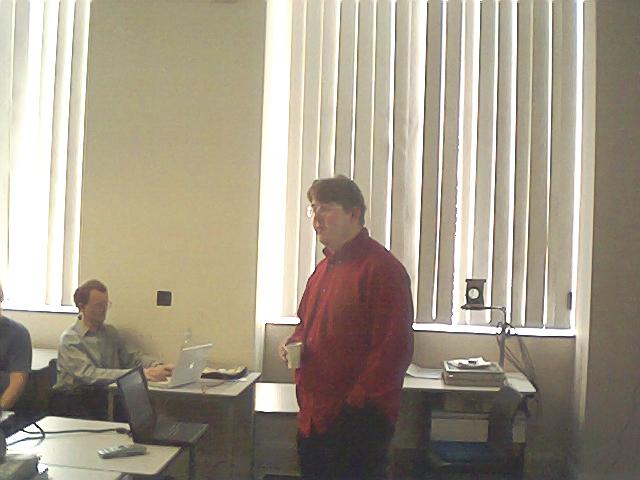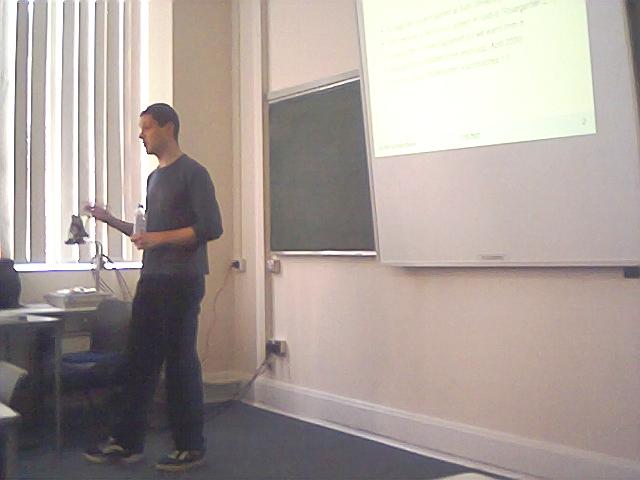| Navigate |
|---|
| Home |
| Join online! |
| Donate |
| News |
| Diary |
| Grants |
| Members |
| Workgroups |
| Thanks |
| About |
| Contact |
Association for Free Software - Annual Conference 2003
Aston University, Birmingham
17 May 2023
About 50 people attended the first annual conference of the Association for Free Sofware
held at Aston University in Birmingham.
The one-day event, which was free to members, included talks on
systems software, sound, education and community & law --
followed at the end of the day by the official annual general
meeting of the association.
As a membership organisation the AFFS constitution requires an AGM to be held once a year, and regular elections of committee members.
The meeting room at the university was well equipped with video
projector and internet access for the talks.
Running an ISP with Free Software
The day started with a talk by Jason Clifford, a well-known
member of the UK free software community, about his latest venture
-- the UK Free Software
Network, a full-service ISP offering dialup, email, domains
and webhosting where all the profits are donated to free software
projects.
He described the significant advantage of using free software in
the ISP business - he had been able to customise all the programs
to require minimal human intervention, reducing the day-to-day
support costs to a very low level. He also operates a commercial
ISP and hosting company ukpost.com using the same
software.
Jason explained that historically there was a close connection
between free software and the internet. His goal with UKFSN was to
provide a way for free software users and developers to keep money
in their own community, rather than paying internet access and
hosting fees to companies whose interests may be aligned against
free software.
To ensure the fairness of the operation he provides full details
of the accounts on the website and has pledged that the
distribution of any profits will be handled by AFFS.
At present UKFSN does not yet have enough "dial-up minutes" to
generate revenue, so more regular users are needed to switch from
their existing ISP.
Jason was enthusiatically applauded by the audience, not just
for his talk but for setting up UKFSN.
Logical Volume Management - LVM2
The next talk was presented by Alisdair Kergon, a developer on
the LVM2 project, a completely new implementation of the existing
Logical Volume Management system in the Linux kernel.
Alisdair works for Sistina
Software, Inc, a company which provides enterprise level
storage solutions, and supports the development of LVM2.
Logical Volume Management is a kernel facility which also
filesystems to span multiple physical disks, by mapping them to
logical volumes. It also provides other useful features such as
snapshots, allowing a filesystem to be kept consistent during
backups.
LVM2 fixes many of the inconsistencies in the existing LVM and
provides a better framework for future developments. LVM2 has been
chosen to be the logical volume management system in the next major
release of the Linux kernel. Alisdair gave a demo of moving a
volume in a live file system between two disks, interrupting the
process halfway through to show how LVM2 was robust against
failures.
More information about logical volume management can be found in
the LVM HOWTO.
Free Audio Software in the Recording Studio
Bob Ham, a musician and software developer, talked about recent developments in professional audio software on GNU/Linux. The new ALSA kernel API for sound is a major advance over the old OSS API and now makes it possible to create professional quality, low-latency applications. His own software includes the ALSA MIDI Patch Bay, JACK Rack, and the Linux Audio Developer's Configuration and Connection API.
Rosegarden - Music Software for Everyone
Richard Bown talked about the upcoming release of Rosegarden-4
a professional quality music editing environment. Rosegarden was
recently featured in Sound on Sound, the UK's top
professional recording magazine. Richard's aim is to provide a
complete solutions for professional and educational users. He
pointed out that at present there is widespread use of illegal
copies of the major proprietary music applications, which creates a
good opportunity for free software.
Richard will be present at the Birmingham LinuxExpo (24-26 June)
demonstrating the software.
KGyfieithu
Kevin Donnelly described KGyfieithu, a project to translate the GNOME and KDE desktop environments into Welsh. It provides a web interface to the standard message files, allowing people to conviently translate a small number of messages and browse similar messages to find the right words. The advantages of using a website over traditional methods (editing .po files) are that it does not require the user to install any software, so that translators do not need to be expert developers. Significant progress has been made on the translations and the software could also be adapted to other projects and languages.Moodle: the weapon of choice
John Adams gave an overview of opportunities for free software in Learning Management Systems. These are widely used in industry and education to deliver training and testing, e.g. through multiple choice questions, but as he pointed out they can also be used as a form of software documentation -- as he does at his own company, which has been setting up ISPs in Africa. At some point in the future the UK education system will eventually adopt a standard, such as IMS or SCORM, and if free software supports the appropriate standard then there will be an opportunity for it to compete with the existing proprietary systems.John also gave a demonstration of his favorite LMS moodle.org, a MySQL/PHP based system developed by Martin Dougiamas of Curtin University in Australia.
FREEDUC (demonstration)
Simon Waters gave a demonstration of FREEDUC a free bootable CD designed for educational users. The CD is based on Knoppix, and presents the user with a complete free operating system and desktop environment without needing to repartition the hard-drive or install any additional software.Using the Law to make sure free software has a fair chance in commercial markets
Ian Lynch talked about free software in commercial markets. His company has made a formal complaint to the Office of Fair Trading about unfair competition in the educational market caused by restrictive terms in the Microsoft Schools Agreement, the standard license that Microsoft uses for schools and colleges throughout the UK. Due to legal restrictions he could not talk about details of his case but instead presented a general overview of UK laws of fair-trading, how the Office of Fair Trading works. Companies in violation of the law can be fined up to 10% of their annual UK turnover. He pointed out that it is free to register a complaint with the OFT, and -- if the case is investigated -- they carry all of the legal costs. He encouraged anyone who believes their own business may have been harmed by proprietary software companies to do so. If the case is proved there is the possibility of claiming substantial damages.Preserving Freedom in the digital environment
Martin Keegan of the Campaign for Digital Rights talked about the danger to free software caused by the European Copyright Directive and Digital Rights Management (DRM). Martin stressed the importance of making the issues known to the public at large, since if people are persuaded to buy computers and other equipment incorporating DRM hardware it will become a defacto standard regardless of the law and there will be no alternatives to it.Software Patents in Europe
Ciaran O'Riordan gave a report on his recent attendance at the meeting "Software Patents: From Legal Wordings to Economic Reality" in Brussels, prior to the upcoming vote in the European Parliament on June 18. The meeting included a conference session at the European Parliament with presentations by Richard Stallman, David Axmark (CEO MySQL) and Hakon Lie, among others. The main conclusion -- those opposed to software patents need to be much more effective in political lobbying if they are to have any effect, and many companies who will be harmed by software patents -- including those in the free software arena --- are not actively opposing them.AGM
Marc Eberhard, Mark Ray, Richard Smedley, Alex Hudson, Brian GoughA brief discussion of accounts and expenses (minimal - the conference room cost 120 pounds), whether people liked to free-entry to members conference format (yes) and a call for people to stand in elections for committee members.
The official minutes will be posted online.
Photo Gallery





